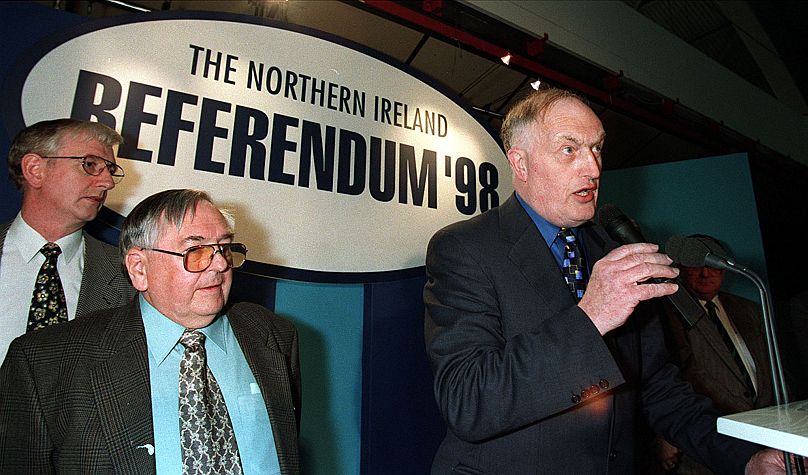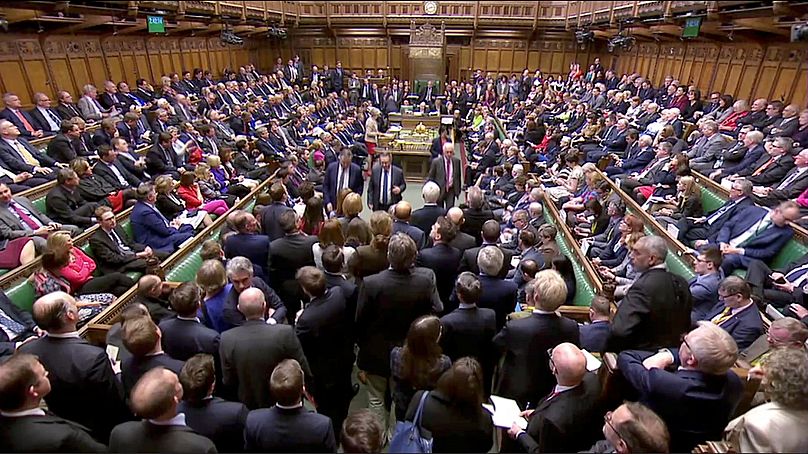‘#WeAreIrishToo’ - Are Irish citizens in Northern Ireland really being reclassified as British after Brexit? Alex and our team in the Cube have the story.
Questions over the future of the Irish border have sunk Theresa May’s withdrawal agreement three times over. But as the Brexit deadline looms, it’s people living on the island of Ireland themselves who have been expressing real anxiety about their rights and their sense of identity.
Posts by activist Emma DeSouza sparked widespread concern on social media, suggesting that Irish citizens living in Northern Ireland were now being reclassified as British because of Brexit.
#WeAreIrishToo was used to express people’s anger and disbelief that such a central change to their legal and personal identity could result from Brexit.
So, what’s really going on here? Let’s break it down.
Two key things to know:
The Good Friday Agreement brought a formal end to decades of violence on the island of Ireland, between Unionists and Republicans.
Crucially, it gave people living in Northern Ireland (the UK) the right to identify as Irish or British or both. The UK Home Office insists that right is respected.
There is also a ‘Common Travel Area’ between the UK and the Republic of Ireland. This long predates the existence of the EU, and is in no way dependant on EU membership. The ‘Common Travel Area’ gives Irish and UK citizens the right to live and work in either country. This will be unaffected by any Brexit outcome.
The rights these two agreements give citizens forms the backdrop to this row.
So, what’s the argument about?
With the UK leaving the European Union, EU citizens are being encouraged to apply for ‘Settled Status’. This is a formal right to remain living in the UK after Brexit.
The Good Friday Agreement and the Common Travel Area mean that Irish citizens do not need to apply to the scheme. Their right to remain in the UK is already guaranteed. However, should Irish citizens wish to apply they can still do so.
Emma is fighting a legal battle with UK authorities in an attempt to secure the right of her American husband to live with her in Northern Ireland.
She wants the right to apply to the Settlement Scheme in order to access EU rights for family members. These are enshrined in Chapter II of the Withdrawal Agreement between the EU and the UK: “Family members that are granted rights under EU law (current spouses and registered partners, parents, grandparents, children, grandchildren and a person in an existing durable relationship), who do not yet live in the same host state as the EU citizen or the UK national will be able to join them in the future”.
The UK Parliament has failed on three occasions to back this agreement, but it remains the only deal on offer from the EU.
Emma DeSouza told Euronews, “I am an Irish national, Irish by birthright and Irish under the Belfast Good Friday Agreement. I do not hold a British passport...
“Irish citizens do not need to apply under the settlement scheme but they can do so if they wish, unless of course you were born in Northern Ireland.
“What we're seeing here is the creation of a two-tier system. Irish citizens that can retain their EU rights and Irish citizens who cannot. The settlement scheme is the only way to access chapter two of the withdrawal agreement and provides a legal underpinning to our EU rights.”
What are authorities saying?
A Home Office spokesperson told Euronews:
“Like all British citizens, people of Northern Ireland who are British or dual citizens cannot be granted status under the EU Settlement Scheme, and their rights and entitlements are not affected by the UK leaving the EU.
“How the people of Northern Ireland can be joined in the UK by their family members is being reviewed. Any solution will be fully compliant with the letter and spirit of the Belfast Agreement.”
In February 2019 Theresa May confirmed that she had requested the Home Secretary to work with the Secretary of State for Northern Ireland to clarify “the issues around the rights of the people of Northern Ireland to be joined in the UK by their family members. This work is ongoing, and as the Prime Minister has said, a solution which complies with the Belfast Agreement will be set out as soon as possible.”
So what does this all mean?
Activists like Emma DeSouza do not want to be considered a UK citizen automatically, simply because they were born in Northern Ireland. They want the same right as Irish citizens born in the South to apply for settled status, as a formal guarantee of their EU rights. This is a highly technical case, relating to Emma’s legal efforts to secure her husband’s right to join her in the UK.
It is clear from all the documentation from the UK and the Irish Governments that the Good Friday Agreement and the Common Travel Area will be protected at all costs, regardless of the Brexit outcome.
However, what this case makes clear is there are still unanswered questions on the exact specifics , and this is feeding into wider anxieties about what Brexit will mean for people living both sides of the Irish border.













